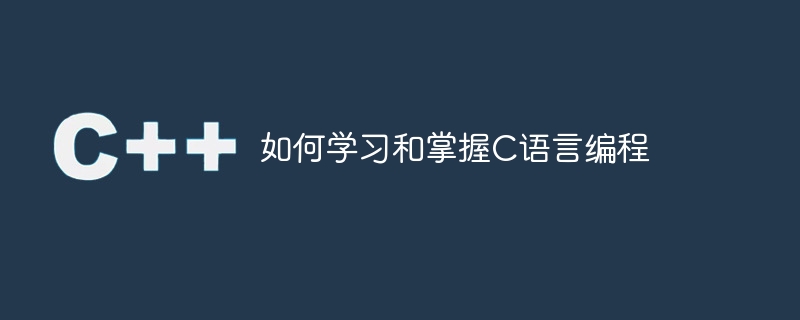
[Title]: How to learn and master C language programming, you need specific code examples
As a widely used programming language, C language has great significance in the field of computer science. important position. Mastering C language programming can help us better understand the underlying principles of computers and improve programming capabilities. This article will discuss how to effectively learn and master C language programming, and provide some specific code examples for readers' reference.
1. Basic concepts
-
Introduction to C language:
C language is a general computer programming language with high efficiency and flexibility. Learning C language can allow us to better understand the underlying principles of computers and improve programming skills.
-
Development environment:
When learning C language programming, you need to prepare a suitable development environment. It is recommended to use an integrated development environment (IDE) such as Visual Studio Code for programming and installation. C language compiler such as GCC, etc.
2. Learning steps
-
Master basic syntax:
- Learn variables, data types, Basic concepts such as operators;
- Be familiar with control statements such as if statements, loop statements, etc.;
- Understand the definition and calling of functions.
-
Understand pointers and memory management:
- Learn the concept and usage of pointers;
- Master Dynamic memory allocation and release methods.
-
Learn common library functions:
- Be familiar with standard input and output functions such as printf() and scanf();
- Master string processing functions such as strcpy() and strlen(), etc.;
- Understand the use of math library functions.
##3. Code examples
The following are some common C language programming examples for readers’ reference:
Hello World:
#include <stdio.h>
int main() {
printf("Hello World!
");
return 0;
}Copy after login
Calculate the sum of two numbers:
#include <stdio.h>
int main() {
int num1 = 10, num2 = 20;
int sum = num1 + num2;
printf("The sum of %d and %d is %d
", num1, num2, sum);
return 0;
}Copy after login
Find Factorial:
#include <stdio.h>
int factorial(int n) {
if (n == 0) {
return 1;
} else {
return n * factorial(n-1);
}
}
int main() {
int num = 5;
int result = factorial(num);
printf("The factorial of %d is %d
", num, result);
return 0;
}Copy after login
4. Summary
By studying the learning steps and code examples described in this article, readers can gradually master the basics of C language programming knowledge and skills and better apply them in actual project development. Learning C language requires continuous practice and practice. Only through continuous hands-on programming can you truly master this programming language. I hope this article can help readers better learn and master C language programming.
The above is the detailed content of How to learn and master C language programming. For more information, please follow other related articles on the PHP Chinese website!






